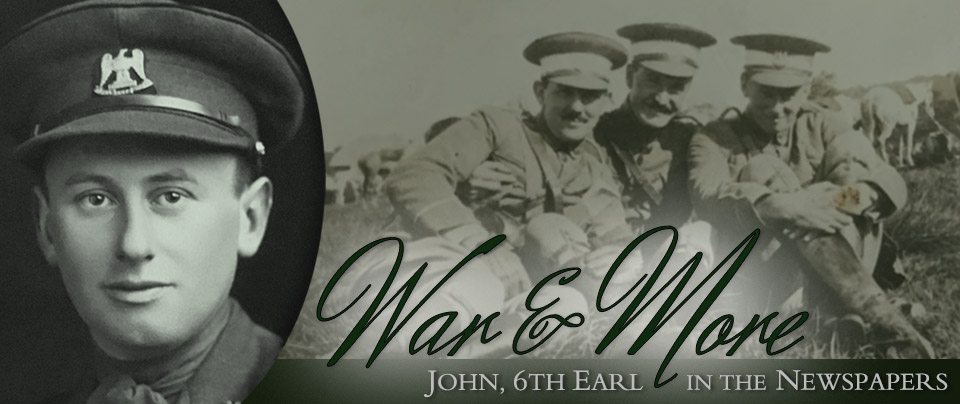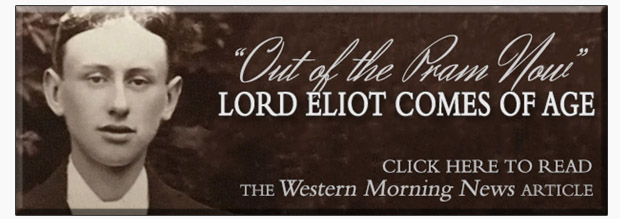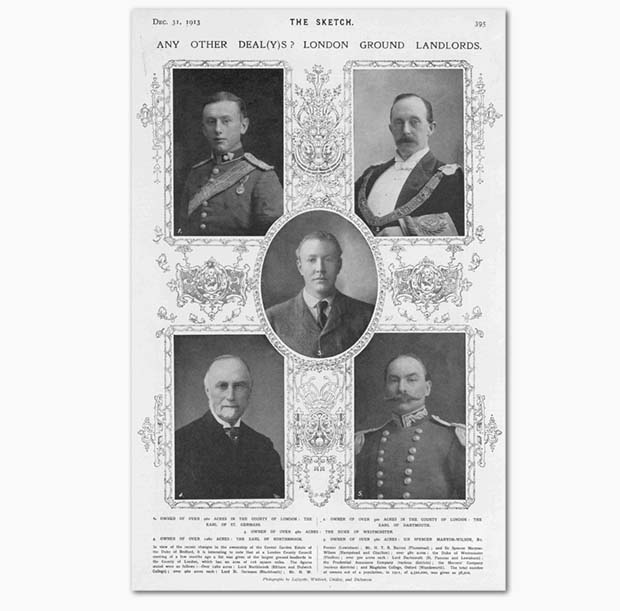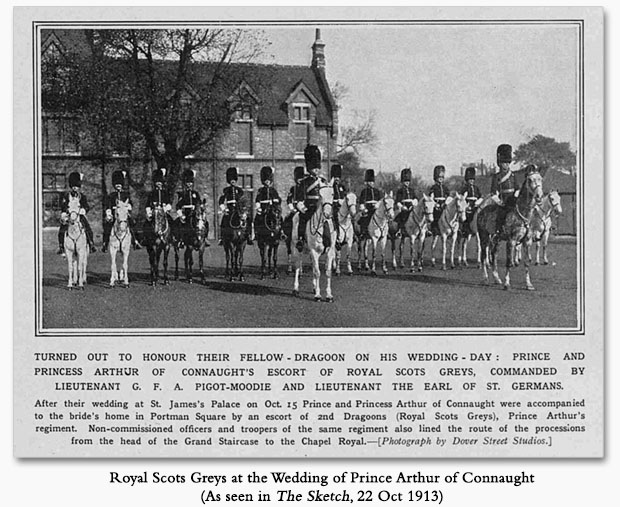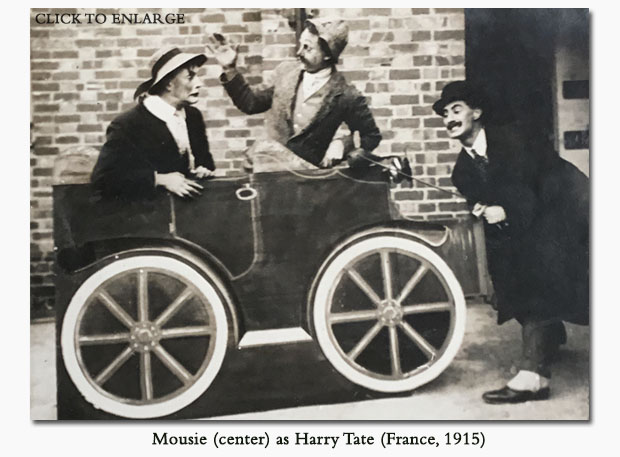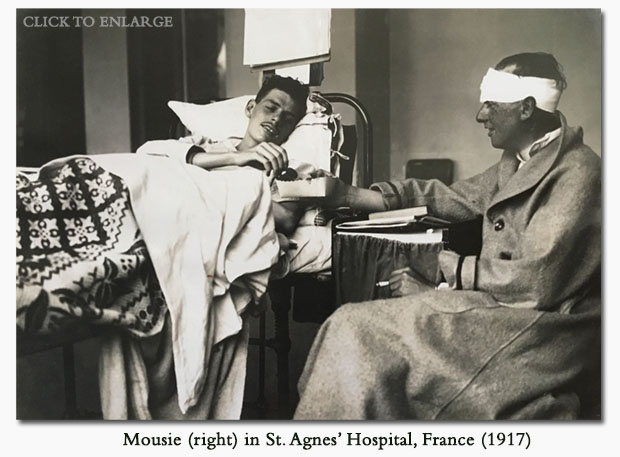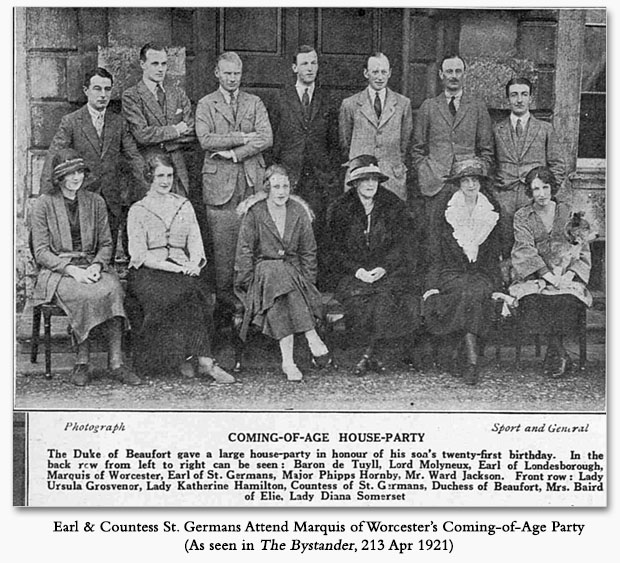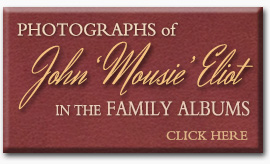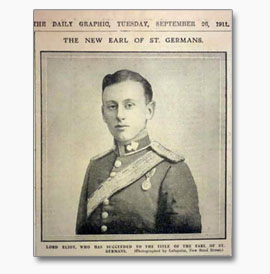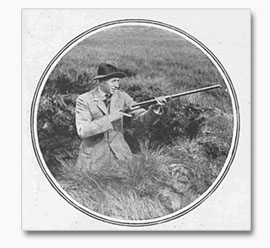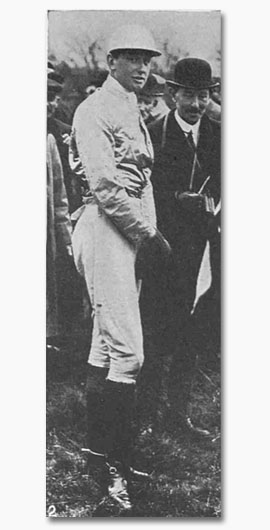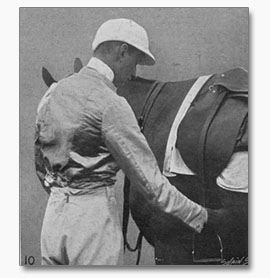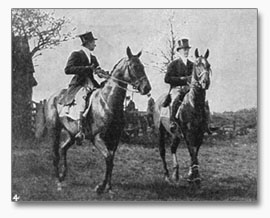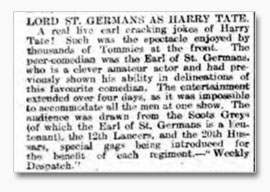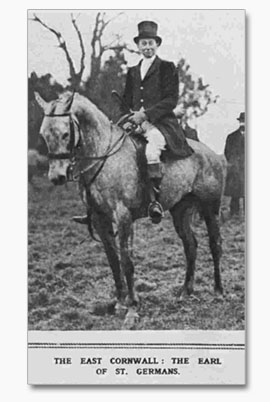John Granville Cornwallis Eliot: War and More
John was the third child and second son of Henry Eliot and Emily Labouchere, known to family and friends as Mousie.
In 1911, not three months after his "coming of age", Mousie inherited Port Eliot and succeeded to the earldom of St. Germans. As for all who inherit familial titles, there was some sadness in this for the new Earl, for his accession had been achieved only by the death of a much-loved brother and a very dear father in less than two years' time. 21 years old and a young officer in the Royal Scots Greys, the 6th Earl of St Germans had only a few years before he was called to rally for "King and Country" (during which he served with distinction, was awarded the Military Medal, and was wounded twice). These were tumultuous years for the young earl, not only because of the war, but also on the homefront. The death tax was so extensive after his father's death that Mousie had to sell his property at Eisey, comprising 700 acres, in order to pay the tax. And not much later, in 1918, due to the war-time taxation, Mousie was forced to sell even more property – this time it was the entire estate of Down Ampney in Gloucestershire. This page chronicles Mousie's time as Earl St. Germans, excepting that of his engagement and marriage (which is chronicled on the following page).
The following newspaper-article transcriptions appear in chronological order.

— "Western Morning News" 10 Jun 1911, page 5:
Lord Eliot, only surviving son of the Earl and Countess of St. Germans, and heir to the estates, attains his majority tomorrow, having been born on June 11th, 1890. His lordship, who is a lieutenant in the Scots Greys, stationed at York, left that city last night for Port Eliot, where the Earl and Countess are at present in residence. In conformity with the wish of the family, the celebration of Lord Eliot's coming-of-age will be of a private character, but Lord Eliot will today meet his father's principal tenants in Cornwall at luncheon at St. Germans, and on Monday he will attend a similar gathering at Gloucester of the tenantry in that county. Congratulatory addresses from the tenantry in Cornwall and Gloucester are in course of preparation, and will be forwarded to Lord Eliot at a later date.
— "Bournemouth Graphic" 12 Jan 1912, page 7:
The Earl of St. Germans has decided to shut up Port Eliot, his family seat in Cornwall, for a time, and his mother, Lady St. Germans, has gone up to London and will make her headquarters, at any rate for a while, at their town house in Grosvenor-gardens. Lord St. Germans is fond of soldiering and does not wish to give it up for the present, added to which the heavy death duties on the estates render the shutting up of his country house an almost necessary step.
— "Sheffield Evening Telegraph" 10 Aug 1912, page 5:
TENANT FARMER BUYS A VILLAGE.
That fortunes can still be made on the land in this country is clearly shown by a transaction that has just taken place in Wiltshire. Mr. H.J. Horton has been a tenant farmer for many years, and so well has he prospered that he has been able to purchase the village of Eisey and about 700 acres of land from the Earl of St. Germans. The village is near Cricklade, in the Vale of White Horse country, on the banks of the Thames, and the property upon it includes a pretty little church.
— "West Briton and Cornwall Advertiser" 28 Nov 1912, page 4:
The sale of the outlying portions of the Earl of St. Germans Down Ampney (Wiltshire) estate realised nearly £10,000.
— "Yorkshire Evening Post" 03 Mar 1913, page 4:
A PAGE FROM PANTOMIME.
Are the extravagances of the American ball-room taking a further hold in this country? Lady Neumann gave a dance in London last week, and we read that, "about two o'clock a diversion was created by the appearance of Lord St. Germans dressed in hunting kit and mounted on a brown hobby-horse and having on two leashes five or six stuffed hounds. Making his way round the room he succeeded in blowing a horn with some skill, and the leaders of the cotillion distributed hunting-crops to the men and small walking sticks to the ladies."
— "Pall Mall Gazette" 23 Apr 1913, page 4:
The Earl of St. Germans has been staying during the past week with the Countess, his mother, at Port Eliot, the family seat in Cornwall.
— "Diss Express" 18 Jul 1913, page 7:
Who are the people who own London? The answer to the question was given at a meeting of the London County Council the other day, when it was stated that the total number of ground landlords is 38,200. The average holding of each would be fairly valuable, but it has to be noted that abut 14,000 people own only one house, which puts up the average for the others considerably. The number of individuals owning five acres and upwards is about 700. There are 116 square miles in the County Council area, and twenty-two of these are held by public authorities, railway companies, and so on. The largest owners are Lord Northbrook and Dulwich College, each owning over two square miles. There are four owners with more than 1-1/2 square miles each. They are Lord St. Germans, Mr. N.W. Forester, M.P., Sir H.F.T. Barron, and Sir Spencer Mayon Wilson. The largest areas, of course, are not always the most valuable, and Lord Northbrook would probably be quite willing to exchange his two miles for the Duke of Westminster's three-quarters of a mile, which includes some of the most valuable land in the West-End. There are other owners with much smaller but enormously valuable holdings.
— "Pall Mall Gazette" 28 Nov 1913, page 3:
The Earl of St. Germans, who, with his mother the Countess, has been entertaining a shooting party at Port Eliot, Cornwall, will spend most of the winter at York, where his regiment, the Royal Scots Greys, is quartered.
— "Berks and Oxon Advertiser" 5 Dec 1913, page 2:
Lady St. Germans and her son Lord St. Germans have been entertaining a shooting party at Port Eliot, where there is some of the best pheasant and wild fowl shooting in Cornwall. Lady St. Germans spent the autumn at Port Eliot, and house in Grosvenor-gardens is for sale. Lord St. Germans has been paying visits for shooting in Scotland, and he will spend most of the winter at York, where his regiment, the Royal Scots Greys, is quartered.
— "Western Morning News" 10 Aug 1914, page 3:
The Earl and Countess of St. Germans have offered Port Eliot as a hospital or convalescent home in case it should be wanted during the war.
— "Pall Mall Gazette" 30 Nov 1914, page 2:
The Earl of St. Germans, lieutenant in the Scots Greys, has been spending a brief leave of absence from the front with the Countess, his mother, at Port Eliot, the family seat in Cornwall.
— "Yorkshire Post" 4 Dec 1914, page 4:
Lord St. Germans has had a few days' leave from the front and took a well-deserved rest at his home at Port Eliot, in Cornwall, after severe fighting with his regiment, the Scots Greys. The Earl of Dundonald's son, Lord Cochrane, also stayed there for some days, and the village went wild with excitement over the soldier heroes.
— "Cheltenham Chronicle" 23 Jan 1915, page 6:
LORD ST. GERMANS AS HARRY TATE.
A real live earl cracking jokes of Harry Tate! Such was the spectacle enjoyed by thousands of Tommies at the front. The peer-comedian was the Earl of St. Germans, who is a clever amateur actor and had previously shown his ability in delineations of this favourite comedian. The entertainment extended over four days, as it was impossible to accomodate all the men at one show. The audience was drawn from the Scots Greys (of which the Earl of St. Germans is a Lieutenant), the 12th Lancers, and the 20th Hussars, special gags being introduced for the benefit of each regiment.
— "Bellshill Speaker" 19 Feb 1915, page 4:
WITH THE BOYS AT THE FRONT.
A reader sends us the following "programme of grand Christmas concert held (Wilhelm permitting) in the Theatre, Archibald Steenwerck, on December 26th, 28th, 29th and 30th, 1914, at 7-30p.m., under the distinguished patronage of Brigadier-General Sir Philip Chewode, Bt., D.S.O.:—
1. Piano Selection (Private Willing)
2. Sont, "Asleep in the Deep" (Private Thomas)
3. Recitation "Kissing Corps Race" (Corporal Bodmin)
4. Hunting Song (S.Q.M.S. Grimes)
5. Song, "Two Eyes of Grey" (Private Robinson)
6. Song, "Love's Golden Treasury" (Sergt. Thomson)
7. An entirely original sketch, "The Dug Out." (Characters — Capt. Calvry Clubbe, res. of Officers, 12th Scotch Hussars; S.Q.M.S. Grimes; Sergt.-Major Fray Bentos, 12th Scotch Hussars; S.Q.M.S. Kilgour; Escort, Prisoners, Loafers, etc., etc., Sergt. Thomson, Ptes. Hooper, Hanlon, Phillips, etc., etc.; Place, time, and situation, The Present. Interval of 10 minutes.
8. Song, "I'm Sorry for Myself" (Trumpeter Godfrey)
9. Song, "Gilbert the Filbert" (Lieut. D. Peploe)
10. Song, "The Wrecker's Light" (Sergt. Thomson)
11. Song, "Rumours" (Lieut. French Blake)
12. Special appearance of Mr. Tarry Hate, who has been engaged at great inconvenience to himself (and the audience). (Mr. Tarry Hate, Earl of St. Germans; Loafers, Policemen, Children, etc., Lieuts. Peploe and French Blake)
13. Song and Dance, "Josie" (Private Oram)
14. Concerted Number, "When We've Wound Up the Watch on the Rhine"
God Save the King.
Pianists, Sergt. Taylor and Pte. Willing.
Scenery and stage effects by Supply Officer, 5th Cavalry Brigade; the stage has been specially suspended at enormous expense to the public on ration biscuits; costumes by Messrs Loot, De Saveur, Stealer & Co., and C.O.O. Advanced Base; German dresses by Gen. Von Kluck (without permission); wigs by Clarkson; piano by Messrs Obus and Booh (it came through the window); liquid refreshments by 5th Cavalry Field Ambulance (No. 9 Fine Old Fruity, Bottled 1877); the Company's faces have been specially overhauled and re-decorated throughout by No. 7 Mobile Veterinary Section.
In accordance with A.R.O., No. 276/ 1/2 /.23, the egg proof curtain will be lowered every few minutes. Gentlemen are requested to avoid unneccessary damage to performers. Bombs, eggs, minenwerfers, sticks, etc., are to be left in the cloak room. You may keep your seat but you must not throw it. Do not shoot the pianist, he is doing his very best."
— "Birkenhead News" 06 Mar 1915, page 8:
EMPIRE THEATRE, LIVERPOOL
At the Empire Theatre on Monday a fine revue, "Business As Usual," will be presented, and is sure to draw big houses. The book is by A.P. de Courville and F.W. Mark (the latter well known in the literary world as E.V. Lucas); the music is by Herman Darewski, with portions written by Mr. James Glover, Drury Lane. Harry Tate's fortifying episode, which was frequently presented at concerts behind the trenches by Earl St. Germans, is included, the Earl impersonating Tate, and with an outfit presented by the comedian. Jack Lorimer, the popular Scotch comedian; Winifred Ward, impersonator; and Peter and Potts, comedians, are in the "bill."
— "Newcastle Journal" 4 May 1915, page 6:
Lord St. Germans has come home to Port Eliot, his place in Cornwall, from the Front, where he has been almost since the beginning of the war, to recuperate.
— "Pall Mall Gazette" 18 May 1915, page 3:
The Earl of St. Germans, who is a lieutenant in the Scots Greys, has been visiting the tenantry on his Down Ampney estate, in Gloucestershire, during his leave of absence from the front.
— "West Briton and Cornwall Advertiser" 22 May 1915, page 3:
APPOINTEMENT FOR THE EARL OF ST. GERMANS.
Lieut. the Earl of St. Germans, Royal Scots Greys, has been appointed as A.D.C. to the Governor of South Australia.
— "Newcastle Journal" 26 May 1915, page 4:
The Earl of St. Germans, who is a lieutenant in the Royal Scots Greys, has been invalided home from the fighting line, and is at present in Yorkshire.
— "Newcastle Journal" 28 May 1915, page 4:
The Times states that the Earl of St. Germans is not going as aide-de-camp to the Governor of South Australia as reported, but is returning to the Reserve Regiment of the Scots Greys at York pending his return to the Front.
— "Newcastle Journal" 31 May 1915, page 4:
The Earl of St. Germans, who is a lieutenant in the Royal Scots Greys, and who had been invalided home from the front, has joined the Reserve Battalion of his regiment pending his full recovery and return to the fighting line.
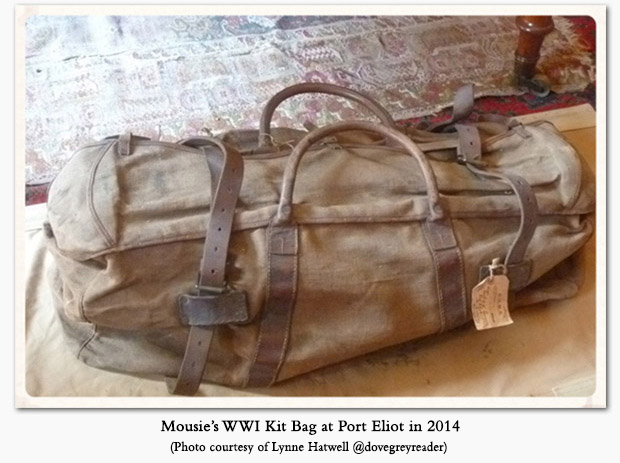
— "Dundee Evening Telegraph" 17 Aug 1915, page 2:
THE EARL OF ST. GERMANS.
The Earl of St. Germans, who has been gazetted an A.D.C. on the personal staff of Sir John French, is one of the cheeriest of characters. He is lieutenant in the 2d Dragoons (the Royal Scots Greys), and has already been mentioned in despatches. In addition to being a capable and cool-headed officer, he is an all-round sportsman and an amateur comedy actor of no mean ability. He is twenty-five years old, a bachelor, and is liked by everyone. He succeeded his father in 1911, the title of the family being taken from the Cornish town of St. Germans.
— "West Briton and Cornwall Advertiser" 19 Aug 1915, page 5:
Lieutenant J.G.C., Earl of St. Germans, 2nd Dragoons, is appointed a personal Staff Aide-de-Camp.
— "Western Daily Press" 7 Jun 1916, page 6:
LOCAL COMMISSIONS.
REGULAR FORCES.
Cavalry. – Second Dragoons. – Supernumerary Lieut. J.G.C. Earl of St. Germans is restored to the Establishment; 25th February.
— "West Briton and Cornwall Advertiser" 10 Aug 1916, page 5:
Lieut. the Earl of St. Germans, who has been constantly at the front since the commencement of the war, was on Thursdy gazetted captain, to date from the 1st inst. His lordship became a second-lieutenant in the 2nd Dragoons (Royal Scots Greys) on June 15th, 1910, and received his second star on October 6th, 1911. He has for some time been the senior subaltern of his regiment.
— "Dundee Courier" 23 Mar 1916, page 6:
"Proper Upset." — The Earl of St. Germans has gone back to duty after spending his leave with his mother at Port Eliot, his Cornish seat. Lord St. Germans is immensely popular on his estates, talks broad Cornish to the farmers and old people, and enters into their joys and sorrows. On an occasion, when asked to preside at the London meeting of the Cornish Association, he bagan by saying he was "proper upset." He succeeded his father in 1911, his elder brother having met with an untimely death.
— "Yorkshire Post and Leeds Intelligencer" 15 Nov 1916, page 7:
Military Crosses [Awarded]
Capt. J. G. Cornwallis, Earl of St. Germans, Dragoons. He, with a working party, carried out his work for about five hours under very heavy fire in the open, displaying great courage and coolness throughout.
— "Newcastle Journal" 20 Feb 1917, page 2:
The Earl of St. Germans, who has lent his house at Port Eliot, St. Germans, Cornwall, to Second-Lieut. and Lady Kathleen Rollo, for their honeymoon, tells a good story of a trooper in his regiment whose feet were more large than graceful. The trooper was on leave in Edinburgh and had occasion to require his boots polished. He summoned a bootblack, who, however, was so impressed with the immensity of the task that he called out to another of his calling across Princess Street: "Come over here, Jamie, and gie us ahand. I hae got an army contract."
— "West Briton and Cornwall Advertiser" 18 Jun 1917, page 3:
The Services of Cornishmen
The Countess of St. Germans on Friday received a telegram from the War-office announcing that Capt. the Earl of St. Germans, M.C., Scots Greys, had been wounded on June 10th. The Captain's wounds were caused by shell explosion. Whilst climbing over the parapet of a trench a shell burst very near him, and he received two severe wounds just above the eyes. He is now in the Duchess of Westminster's Hospital in France, and is progressing favourably. In St. German's Parish Church on Sunday thanksgiving was offered for the preservation of his lordship's life.
— "Western Morning News" 18 Jun 1917, page 4:
The injuries received by Capt. the Earl of St. Germans, R. Scots Greys, on Tuesday of last week, were caused by shell explosion. Whilst climbing over the parapet of a trench a shell burst very near him, and he received two severe wounds just above the eyes. He is now in the Duchess of Westminster's Hospital in France, and is progressing favourably. In St. Germans parish church yesterday thanksgiving was offered for the preservation of his lordship's life.
— "Cambridge Daily News" 25 Apr 1918, page 4:
C.W.S. Land Purchases.
In continuance of the vigorous agricultural policy recently initiated by the Co-operative Wholesale Society, Lt., two large estates have just been purchased by this federation of co-operative societies. One of these is the Midland Hall Estate in Northumberland, between Beale and Bolsay . . .
The C.W.S. has also puchased from the Earl of St. Germans an estate in Down Ampney, in the counties of Wiltshire and Gloucestershire, comprising 4,100 acres, 10 farms, 2 villages, 80 dwelling houses, and a large mansion known as the Down Ampney Hall. These purchases are associated with the scheme of national farming on co-operative lines with the idea of producing commodities for sale among co-operative societies. With this object in view the C.W.S. has purchased during the page two years about 25,000 acres of agricultural land in Cambridgeshire, Lancashire, Yorkshire, Cheshire and Wiltshire and Gloucestershire.
— "Northampton Mercury" 6 Jun 1919, page 12:
The baptism of the twin children of Captain Edward Compton (late Scots Greys) and Mrs. Edward Compton took place on Tuesday afternoon at St. Margaret's Church, Westminster, where the double ceremony was performed by Canon Edgar Sheppard, C.C., Sub-Dean of the Chapels Royal. The boy received the name of Alwyne Arthur, and his sponsors were Prince Arthur of Connaught (for whom Lord Colebrooke stood proxy), the Marquis of Northampton, and Lady Zia Wernher. The girl was given the name of Mary, and her sponsors were the Earl of St. Germans, Lady Rosabelle Brand, and Miss Myrtle Farquharson.
— "Western Morning News" 6 Sep 1920, page 7:
SOUTH HILL CROSS UNVEILED BY LORD ST. GERMANS
A memorial, consisting of a Cornish cross of granite, erected at Golberdon Four Land End, was unveiled yesterday. There was a large, and representative attendance, including about 60 Comrades from Callington, under Commandant N.U. Dymond. Mr. N. Coad presided, and suitable hymns were sung. Rev. R.W. Pickersgill (Wesleyan) gave a short address.
The memorial was unveiled by the Earl of St. Germans, who said: No better monument could be conceived than one of Cornish granite – a product of their native county. We wanted to keep the memory of the fallen green, so as to uplift our thoughts to the noble spirit of sacrifice which had freed our land from foreign invasion. Let us all try to lead better lives, so that the lives given should not be wasted.
Rev. G. Rhys (rector of Linkinhorne) offered prayer, and Mr. H.E.L. Pearce, on behalf of the War Memorial Committee, asked the Parish Council to be custodians of the memorial. Mr. Coad (chairman of the Parish Council) accepted, and said they would regard it as one of their most sacred charges. – "Last Post" was sounded by Mr. E.J. Holman, of the Plymouth Comrades, and numerous wreaths were placed at the foot of the memorial.
The inscription on the cross is:– "This cross was erected by the inhabitants of South Hill to the memory of G. Doney, T.J. Drew, P. Jenkin, W.G. Laundry, G. Forster-Morris, W. Stevens, who gave their lives in the Great War, A.D. 1914-1918. Also to all who fought for their country from this parish."
— "Western Morning News" 14 December 1920, page 5:
LORD ST. GERMANS' COLLECTION UNDER THE HAMMER.
At Christie's yesterday a small and choice collection of porcelain, the property of the Earl of St. Germans, was sold. The collection, which had been removed from Port Eliot, under the guidance of Mr. Albert Amor, the eminent expert, brought in a total sum of about 450 pounds. The chief sum obtained was 125 guineas for 21 Chinese octagonal dishes of the Kien-Lung period. A Derby china service, which realized 115 guineas, was eagerly competed for. Mr. George Robey, as a bidder, endeavoured to obtain possession of the article, but at the final offer he had to acknowledge defeat by Mr. Withers. Three Chinese famille rose deep dishes of the Kien-Lung period went to Mr. Mallett, of Bath, for 85 guineas, and the same purchaser also secured three Chinese rose dishes of the same period for 58 guineas.
